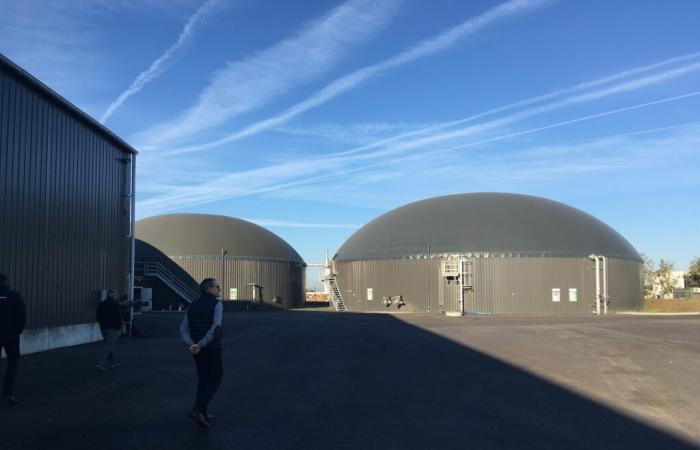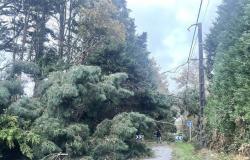The Loire" rel="tag">Pays de la Loire region is a pioneering territory favorable to the energy transition. Projects are multiplying, providing concrete responses to climate issues. The renewable and low-carbon gas sector, driven by a common vision, is developing with strength and consistency. Today, the Pays de la Loire Region is proud to announce that the installed capacity for renewable gas injection into the gas distribution and transport networks exceeds TWh, the equivalent of nearly 6% of the consumption of the region in 2023. This symbolic milestone reached in less than ten years, testifies to the dynamism of the region in terms of energy transition and confirms its leading role in the development of renewable energies in France.
Biomethane production capacity on the networks exceeds TWh
This is equivalent to the annual gas consumption of nearly 170,000 average homes. As the Pays de la Loire Region points out, renewable gas is already a reality alongside other renewable energies such as wood energy, wind power and photovoltaics. The Loire gas sector is now ready to accelerate the growth of renewable gases so that the Region can meet its “Positive Energy Region” ambition by 2050, with an intermediate milestone of more than 20% gas. renewable in 2030.
Concrete benefits for the region
This massive development of renewable gases in the Pays de la Loire is fully in line with the energy transition objectives, with several major positive impacts:
– Reduction of greenhouse gas emissions: By producing local, carbon-free energy, the region contributes to reducing the carbon footprint while supporting national commitments in the fight against climate change. 1 TWh of renewable gas injected into the networks means nearly 195 ktonnes of CO2 avoided each year, contributing to the national objective of carbon neutrality by 2050.
– Creation of non-relocatable jobs: The biogas sector has already enabled the creation of more than 500 direct jobs in the region, whether in the construction, operation or maintenance of installations. These jobs, anchored locally, contribute to the economic dynamism of the region.
– Strengthening energy sovereignty: Thanks to local renewable energy production, the region reduces its dependence on imported fossil fuels and guarantees increased resilience to fluctuations in the energy market. With energy production equivalent to nearly 6% of regional gas consumption, Pays de la Loire is reducing its dependence on imported fossil fuels, thus ensuring increased resilience in the face of fluctuations in the global market. The share of renewable gas by 2030, the ambition of which is to reach 20% nationally (data from the “Gas 2024 Perspectives” scenario planning exercise of network operators proposing a trajectory compatible with the climate objectives of the European Fit for plan 55) represent between 25% and 30% in the territory of the Pays de la Loire Region. This development is based on an increase in biomethane production in line with the latest data communicated on the French Energy Climate Strategy (SFEC) as well as on a scenario of a significant drop in consumption by 2030 (-20% compared to 2023 due to actions for sobriety, energy efficiency, etc.).
A structured and job-creating sector
The development of renewable and low-carbon gases is a real asset for the regions. These are not only responses to environmental challenges, but also opportunities for farmers and local industries. Each methanization project, each production unit, is a lever for employment and local economic dynamism while ensuring decarbonization of uses, including in the short loop. The multiple territorial initiatives around bioNGV are the first witness to this, supported by numerous communities. For all these reasons (energy transition, local development, energy sovereignty, territorial resilience), the Pays de la Loire Region supports and encourages the development of the production and uses of renewable gases, and supports the structuring of associated ecosystems. In order to anticipate, from now on, the skills needs in a rapidly changing field, to offer targeted, innovative and certified training, and to promote this training among young people, job seekers or employees undergoing retraining, the Region and the rectorate and a collective of economic, training and academic players have created the Sustainable Energies Campus. The regional ecosystem is unique compared to other territories: driven by key players such as the Association of Local Initiatives for Energy and the Environment (AILE), the Méthatlantique Association, the Association of Methanizer Farmers des Pays la Loire, the Pays de la Loire Chamber of Agriculture and the members of the Entente des Territoires d’Energie. This ecosystem plays a determining role in supporting and structuring the sector. These structures facilitate the emergence of new projects by supporting initiative leaders, producers, communities and companies in the renewable and low-carbon gas sector.






